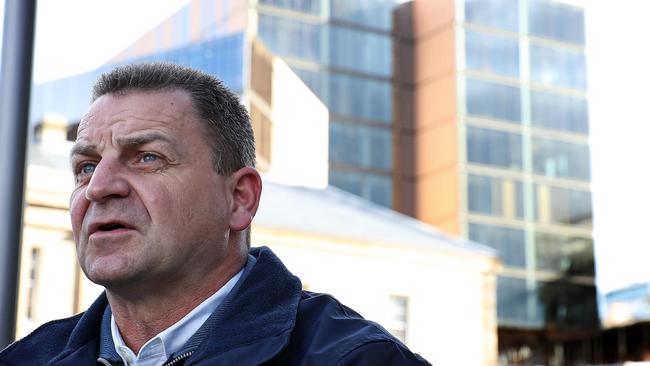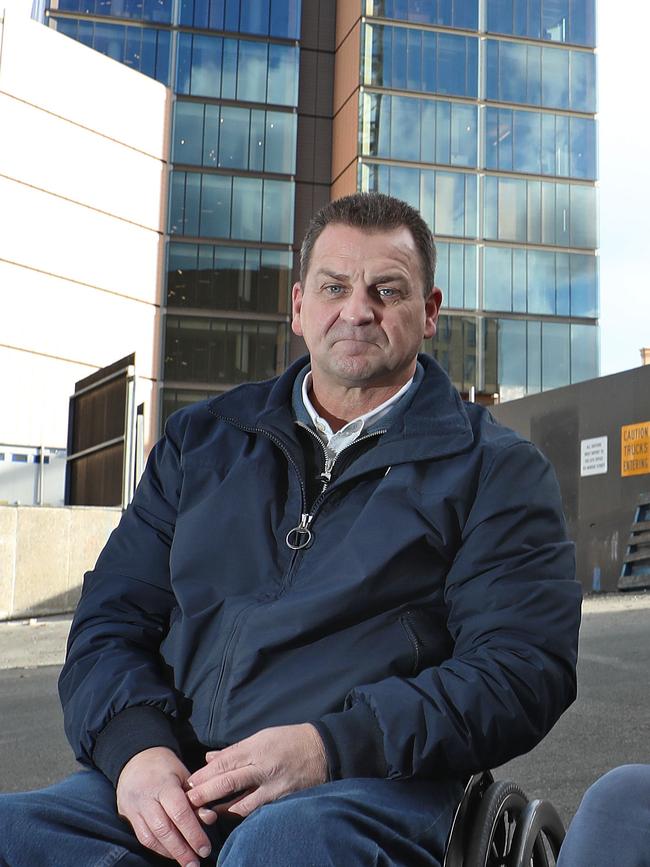Full bench of High Court considering Hobart man’s ‘David and Goliath’ disability case
The full bench of the nation’s highest court is now considering a Tasmanian building disability access case, which could have far-reaching implications across the country.
Opinion
Don't miss out on the headlines from Opinion. Followed categories will be added to My News.
THE entire judicial bench of the High Court is now considering a disability access legal battle that, until this point, has been waged in Hobart for more than five years.
The full bench of the nation’s highest court – comprising all seven judges – has reserved its decision to deliver at a future date.
A two-day hearing was held this week in Canberra, with a collection of Australia’s most high-profile silks arguing over whether federal building access standards override state anti-discrimination legislation.
The High Court decision will be precedent-setting and could have far-reaching implications for building developments in every state of Australia.
Because of the case’s implications for other states, the battle has not only seen the intervention of Tasmania’s Attorney-General and the Australian Human Rights Commission, but also the Commonwealth and the states of Victoria, NSW, Queensland, South Australia and Western Australia.

The challenge was brought to the High Court by the developer and owner of Hobart’s new Parliament Square, which is fighting disability advocate David Cawthorn.
Mr Cawthorn, who has paraplegia, says a lift must be installed at the Murray Street entrance – and that to not do so amounts to discrimination against people with disabilities.
During this week’s hearing, David Batt QC, representing developer Citta Hobart and the Parliament Square landowner, told the panel of judges that Tasmania’s Anti-Discrimination Tribunal had been correct in determining it didn’t have jurisdiction to hear the case.
He said there was a “real conflict” between federal disability legislation and Tasmania’s Anti-Discrimination Act and that Citta Hobart had acted in accordance with the National Construction Code and federal disability access standards when building Parliament Square.Mr Batt said the state laws imposed obligations upon developers that were greater than those imposed by federal law.
Ron Merkel QC, acting for Mr Cawthorn, argued that a decision by the Full Court of the Supreme Court of Tasmania was correct by overturning the tribunal’s decision not to hear the case.
He argued tribunals throughout Australia should be able to determine whether they hear cases in which constitutional defences are raised.
High Court call on legal hurdle to disabled access to Parliament Sq
Words by David Cawthorn
The Full Bench of the High Court in Canberra will today and tomorrow hear a constitutional case with far-reaching implications for tribunals and disability discrimination nationwide.
The significance of the case meant the Commonwealth and every state has intervened, as has the Australian Human Rights Commission.
The central case is about equal access to the $330m Parliament Square development behind Parliament House. The Paraquad Association of Tasmania and I filed a complaint under the Tasmanian Anti-Discrimination Act an astonishing five years ago.
Our case is that people who rely on a wheelchair to get around, like me, should not have to climb stairs to access Parliament Square. A lift should be installed in the northeast corner next to a flight of stairs which will help parents with prams and older people. The lift would cost not more than $400,000, less than 0.1 per cent of the recent sale price of Parliament Square.

Rather than the Anti-Discrimination Tribunal determining the substantive case, the developers argued the tribunal could not hear the case because they had raised a constitutional defence, namely that there was inconsistency between state and Commonwealth discrimination laws.
There are two reasons why the case is important. First, the High Court will determine whether tribunals can form their own view in cases in which constitutional defences are raised. If they cannot, the developer/owner, the Commonwealth and Tasmania say that should be the end of the complaint.
The High Court’s judgment will provide clarification for tribunals across Australia, dealing with matters as diverse as residential tenancies, guardianship and administration and workers compensation where a constitutional issue arises.
The second question that the High Court will consider is whether Commonwealth building access standards override Tasmanian legislation which prohibits disability discrimination
The developers say the Commonwealth standards require 50 per cent of entrances to be accessible but Tasmanian legislation provides for equal access to all buildings and public spaces.
In written submissions, the Commonwealth has argued that Tasmania’s higher standard “undermines the certainty intended to be afforded to building certifiers”. However, other states have sided with the mobility impaired in arguing that higher standards are not inconsistent but rather a “supplementary protection”. They say states should have the power to legislate for better equal access.

Disappointingly, the Tasmanian government sided with the multimillion-dollar developers and owner in arguing the tribunal should not have heard my case.
More disheartening is the failure of the government to advocate for Tasmania’s anti-discrimination legislation. In a case partly concerned with protecting our gold standard anti-discrimination laws, the government has stayed silent. While the Australian Human Rights Commission and other states have argued in support of protecting Tasmania’s anti-discrimination legislation, the Tasmanian Attorney-General has said nothing.
The Premier has been prepared to publicly call out the PM in demanding the religious discrimination laws do not weaken our anti-discrimination laws. Our Attorney-General instructed the Solicitor-General to argue that my case for equal access should be dismissed.
It is a shame the government has sided with a multimillion-dollar developer and owner and against improved access for people who have a mobility impairment.
But, before the Full Bench of the High Court, I will get my chance to say it loud and say it clear: We don’t want an uphill battle. We just want equal access.
David Cawthorn is a disability advocate and the respondent in the High Court case of Citta Hobart Pty Ltd and Anor v Cawthorn.



